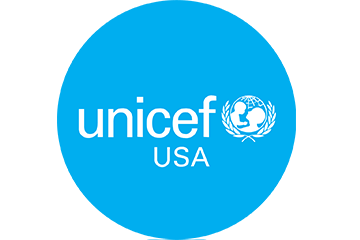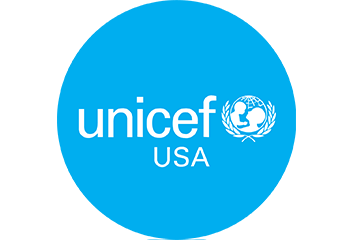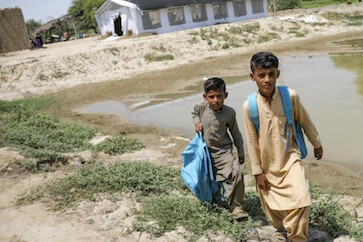It’s a sunny Thursday afternoon and the central market at Mahama Refugee Camp in Eastern Rwanda is bustling with people coming in and out.
Loud music blares from one corner of the market, where a small crowd has gathered. In between musical breaks, a salesman is heard making his pitch, urging marketgoers to buy potatoes at “giveaway prices.”
Nearby, two youth volunteers wearing green-and-white reflector vests hold bottles of hand sanitizer and infrared thermometers. They keep a keen eye on everyone who walks through the entrance of the marketplace.
Their task is to help enforce COVID-19 prevention measures, including the requirement that everyone entering the market wash their hands with soap.
In a busy marketplace, youth volunteers offer hand sanitizer and temperature checks
When Jeanine Nijimbere, an entrepreneur, makes her way to the market, she is screened for temperature. She’s in a hurry, but she still heads for the handwashing station not far from the entrance to wash her hands with soap. She then walks briskly to her stall, where she sells clothing and assorted merchandise.
Clients are already waiting.
“I believe it is natural that some people will tend to let their guard down because COVID-19 has been here for a long time,” a masked-up Nijimbere says after serving her customers. “However, if we are to ensure business continuity, we must act responsibly. We’re always reminded that this virus hasn’t gone anywhere, just yet.”
When I first heard of COVID-19, it felt like a distant rumor. I actually didn’t think it was real.
In the market, she says, vendors and shoppers try to maintain physical distance, as much as space can allow, and keep their masks on to avoid the spread of the virus.
“The youth volunteers cannot be everywhere,” says the entrepreneur, pointing to the two young people standing at the entrance of the market. “It starts with me. It is my responsibility to ensure that at least my clients follow the guidelines when they come to buy goods from my stall.”
But Nijimbere, like many others, didn’t take the pandemic seriously in the beginning.
“When I first heard of COVID-19, it felt like a distant rumor. I actually didn’t think it was real. I thought it was fake news — I just couldn’t get my head around it.”
But it soon dawned on her that COVID-19 was real — and deadly too.
Understandably, she panicked. “We didn’t know exactly how to deal with the situation.”
Live radio broadcasts and road shows address misconceptions and a new variant
Soon after the outbreak began, the Rwandan government started broadcasting messages about the pandemic, including on radio, the most popular form of media in Rwanda. Yet for people like Nijimbere, this was still not enough because they woke up every morning to earn a living and there was no time to listen to the radio.
In November 2021, UNICEF and partners launched an outreach campaign in the camp and in surrounding host communities, presenting special radio programs and community road shows aimed at raising awareness about COVID-19.
“The radio came to the market,” she says, referring to ADECCO Izuba Radio, a community radio station based in Ngoma District, which broadcast live COVID-19 communications in and around the camp, including markets. “This is where I spend most of my daytime and the approach couldn’t have been more appropriate for people like me.”
I know all about this pandemic. That’s why I have been able to keep myself and my children safe.
“Now, more than ever, we need to take this pandemic seriously and be on alert. I have heard that there is a new variant which spreads faster than the earlier strains,” she adds, referring to the recent outbreak of the Omicron COVID-19 variant.
“I have tightened measures both at home and here [in the market]. I keep reminding people to keep their distance, wash hands regularly and put on their face masks properly.”
The targeted mass mobilization effort in and around the refugee camp is part of UNICEF’s broader support to the government’s COVID-19-related awareness-raising nationally.
The campaign also featured group presentations on virus prevention and precautions for children who attend Early Childhood Development (ECD) centers, parents, ECD caretakers and community volunteers.
The campaign has reached a total of 200,000 people in and around the camp. It also directly served 100 ECD caretakers, with a view to ensuring the safe reopening of ECD centers.
— UNICEF Rwanda (@unicefrw) December 17, 2021
In another part of the camp, around 50 people gather at a community hall to listen to a live special program on how to protect oneself against COVID-19 on the Izuba radio station.
One of those present was Damien Ndayishimiye, a father of five and a middle-aged refugee from Burundi.
The radio program addressed important issues like COVID-19 signs and symptoms, how the virus is transmitted, how it can be prevented from spreading, the importance of vaccines, additional safety measures, tips to protect mental well-being and continue practicing positive parenting in the context of the pandemic.
The live broadcast lasts 90 minutes before the audience is allowed to ask questions on the virus and vaccines. Radio hosts also pose questions to the audience to make the session more engaging and interesting.
Interactive programs emphasize the importance of COVID-19 vaccines and prevention
“What do you think is the importance of COVID-19 vaccines?” a host asks his keenly attentive audience. He is met with a flurry of accurate responses. Ndayishimiye raises his hand to answer.
“This vaccine helps prevent severe illness in case one has contracted the virus. But it’s no magic bullet, so it’s not a cure per se. That is why, even after vaccination, we must continue to take all precautions.”
That’s correct, the host says. Applause fills the hall.
After the session, Ndayishimiye confesses he was a vaccine skeptic before the radio program. “There were a lot of rumors about the safety of the vaccines, and I had my doubts.”
For weeks, he and his family had stayed away from vaccination sites.
“One day, I was invited to one of the live radio discussions a week after Radio Izuba had started the broadcasts her. I remember that I asked many questions and each of them was answered to my satisfaction.”
Soon after, Ndayishimiye and his wife received their first vaccine shots. Their 17-year-old son received his a few days later.
“Once I was convinced, it was easy to convince my family too. I was the one who was initially resisting the most.”
His neighbors and friends have also since been vaccinated.
Dorcas,6, is one of many preschoolers who returned to ECD Centers at Mahama Refugee Camp when it was safe to. @UNICEFUSA /Next Generation supported training of ECD caregivers and parents’ engagement on #COVID19 prevention and control. @RwandaEmergencyhttps://t.co/o5IrT7LtNl
— UNICEF Rwanda (@unicefrw) December 24, 2021
With generous support from UNICEF USA NextGen, the awareness campaign also includes specially created episodes of a daily radio program for children, called Itetero, with songs, jingles and entertaining, child-friendly information on COVID-19 prevention.
The child-focused COVID-19 programming features quizzes with prizes ranging from COVID-19 prevention coloring books and pencils to face masks to sanitizers. Slots were also created on air for interactive radio sessions involving children between the ages of 3 and 6, parents and caregivers both in and around the camp. Up to 30,000 children have been reached.
For people like Nijimbere and Ndayishimiye, the campaign has been instrumental in bringing about behavioral change around COVID-19. “This program has totally altered our thinking,” says Nijimbere. “We have also become change agents because we now know that for us to defeat this pandemic, we’ll need all hands on deck.”
Support UNICEF’s efforts to end the pandemic. Donate today.
Top photo: Jeanine Nijimbere at her stall at the central market in Mahama Refugee Camp in eastern Rwanda. A UNICEF-supported outreach campaign taught her how to protect herself and her community from the spread of the coronavirus. “Now, more than ever, we need to take this pandemic seriously and be on alert,” she says.”© UNICEF/2021





